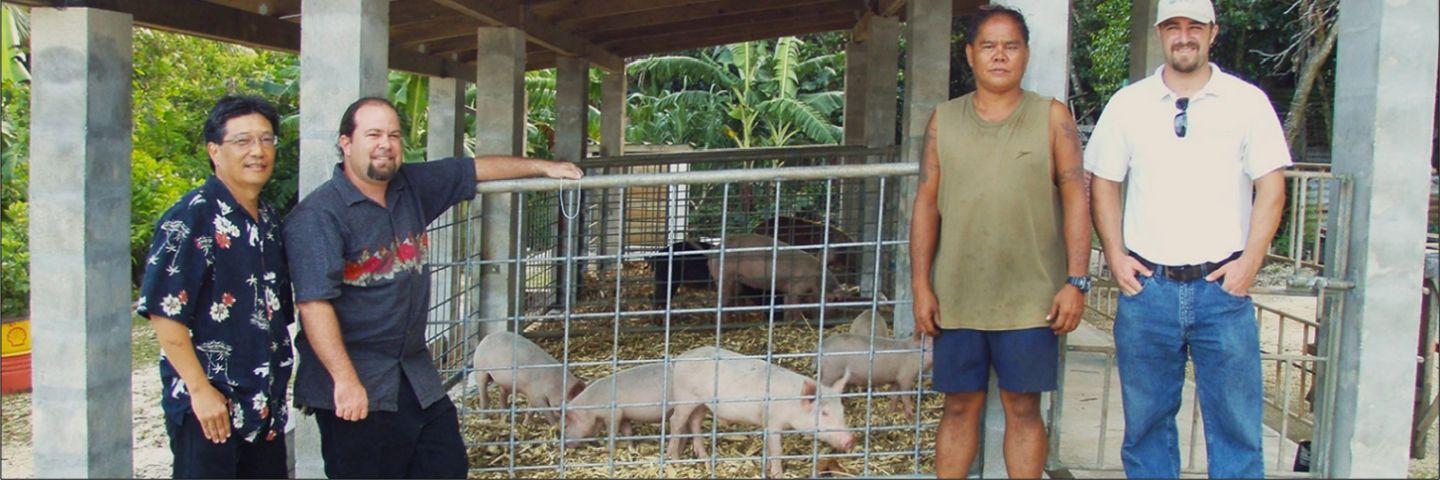Producers in PIA Encouraged to Apply Now for USDA Conservation Programs

Farm Bill and Inflation Reduction Act Funds are available now.
HONOLULU, Oct. 19, 2023 – The U.S. Department of Agriculture (USDA) is encouraging agricultural producers and forest landowners in the Pacific Islands Area to participate in voluntary conservation programs and adopt climate-smart practices in fiscal year 2024 as part of President Biden’s Investing in America agenda. USDA’s Natural Resources Conservation Service (NRCS) is accepting applications for the Environmental Quality Incentives Program (EQIP), Conservation Stewardship Program (CSP) and Agricultural Conservation Easement Program (ACEP), which help a wide variety of producers, including urban and organic producers.
“Whether you measure your farm in square feet or acres, or you farm in the country or in the middle of the city, the Natural Resources Conservation Service has conservation assistance for you,” Pacific Islands Area Director J.B. Martin said. “Right now, we are offering a historic amount of funding through both the Farm Bill and the Inflation Reduction Act, so you should apply today. We encourage all who have natural resource concerns, including producers who haven’t worked with us before, to consider applying. A conservation plan and program may be right for your ag operation.”
For fiscal year 2024, NRCS has $3 billion in Inflation Reduction Act funds to invest in climate-smart mitigation activities. This year, NRCS expanded the list of those activities as well as expanded priority areas for ACEP for grasslands, wetlands and farmlands at risk of conversion. Learn more about those expansions in our Sept. 28, 2023 news release.
Additionally, for fiscal year 2024, NRCS has over $2 billion in Farm Bill funding available to producers for priorities like organic and urban agriculture, soil health, water quality and quantity and wildlife habitat development. This extensive amount of funding will be used to meet producer demand for our oversubscribed programs, maximize climate benefits and help producers address their natural resource challenges.
NRCS accepts producer applications for its conservation programs year-round; however, producers in the Pacific Islands Area interested in fiscal year 2024 funding have two deadlines – Nov. 3 and March 8, 2024 – to apply for EQIP, CSP and ACEP. Producers can apply for funding from both the Farm Bill and the Inflation Reduction Act. In many cases, because of additional flexibilities, applications for eligible practices that meet or exceed state-determined minimum ranking thresholds will automatically be considered for priority funding when applying for EQIP and CSP.
Organic Agriculture
NRCS provides technical and financial assistance for conservation practices that are popular among organic as well as traditional producers, including cover crops, integrated pest management, drip irrigation, high tunnels and rotational grazing. Additionally, for those producers transitioning to organic production, NRCS also provides assistance for a new organic management conservation practice, which was introduced in fiscal year 2023 as part of USDA’s Organic Transition Initiative. The new organic management practice allows flexibility for producers to get the assistance and education they need, such as attending workshops or requesting help from experts or mentors. It supports organic conservation activities and practices required for organic certification and may provide foregone income reimbursement for dips in production during the transition period. Learn more on NRCS’ Organic Agriculture webpage.
Urban Agriculture
NRCS provides technical and financial assistance for conservation practices that are popular among urban producers, including high tunnels, soil health management systems, composting, irrigation, and weed and pest management. Urban agriculture includes the cultivation, processing, and distribution of agricultural products in urban and suburban areas. Community gardens, rooftop farms, hydroponic, aeroponic and aquaponic facilities and vertical production, are all examples of urban agriculture. Learn more on NRCS’ Urban Agriculture webpage.
Inflation Reduction Act
The Inflation Reduction Act, the largest climate investment in history, is a historic, once-in-a-generation investment and opportunity for the agricultural communities that USDA serves. The Inflation Reduction Act will help producers stay on the farm, prevent producers from becoming ineligible for future assistance and promote climate-smart agriculture by increasing access to conservation assistance. In addition to the investments in agriculture, the Inflation Reduction Act extended authorities for certain Farm Bill programs – EQIP, CSP, ACEP and Regional Conservation Partnership Program – until fiscal year 2031.
For more information about assistance available, contact your local Pacific Islands Area USDA Service Center.
USDA touches the lives of all Americans each day in so many positive ways. Under the Biden-Harris administration, USDA is transforming America’s food system with a greater focus on more resilient local and regional food production, fairer markets for all producers, ensuring access to safe, healthy and nutritious food in all communities, building new markets and streams of income for farmers and producers using climate smart food and forestry practices, making historic investments in infrastructure and clean energy capabilities in rural America, and committing to equity across the Department by removing systemic barriers and building a workforce more representative of America. To learn more, visit usda.gov.

